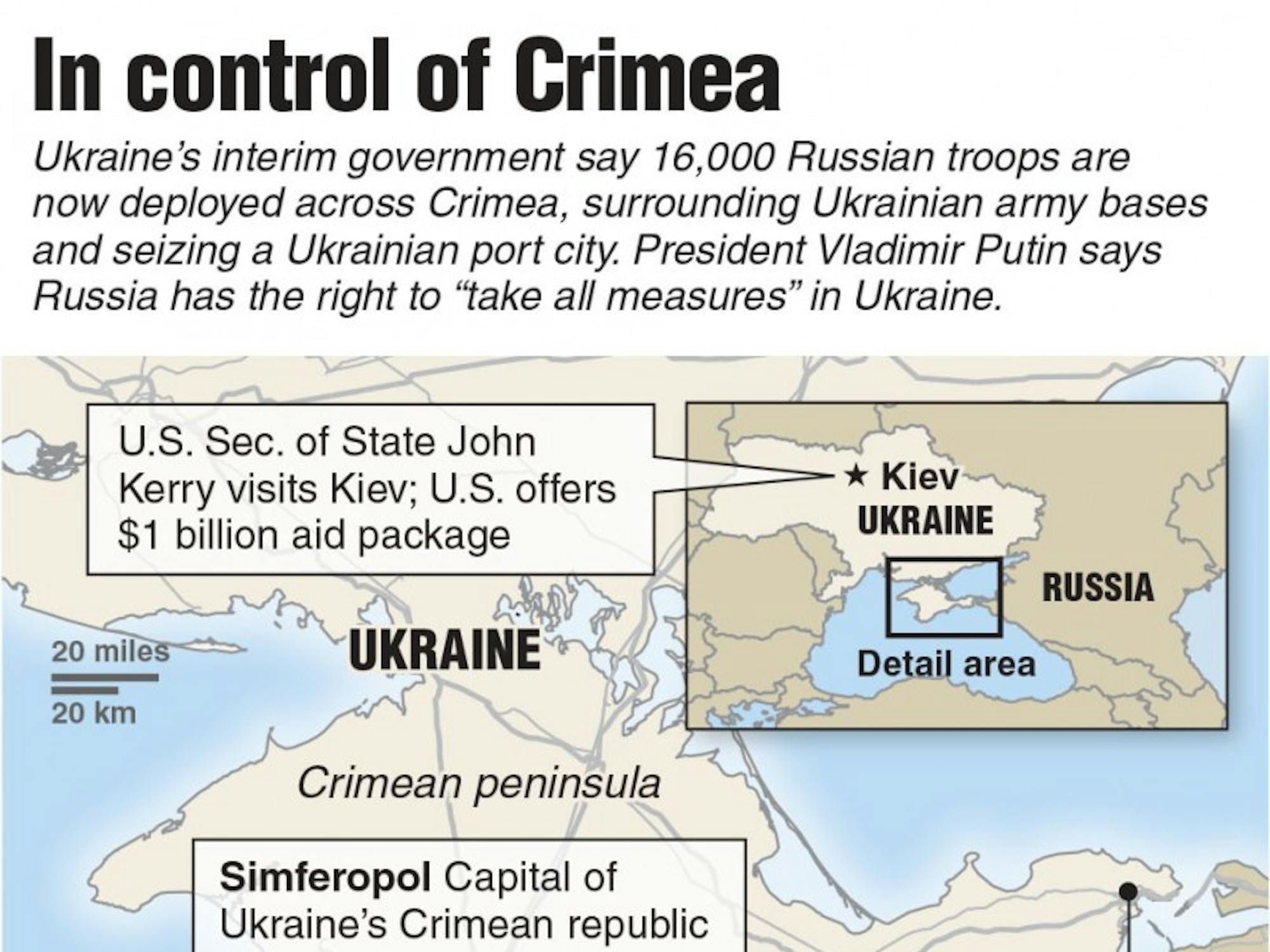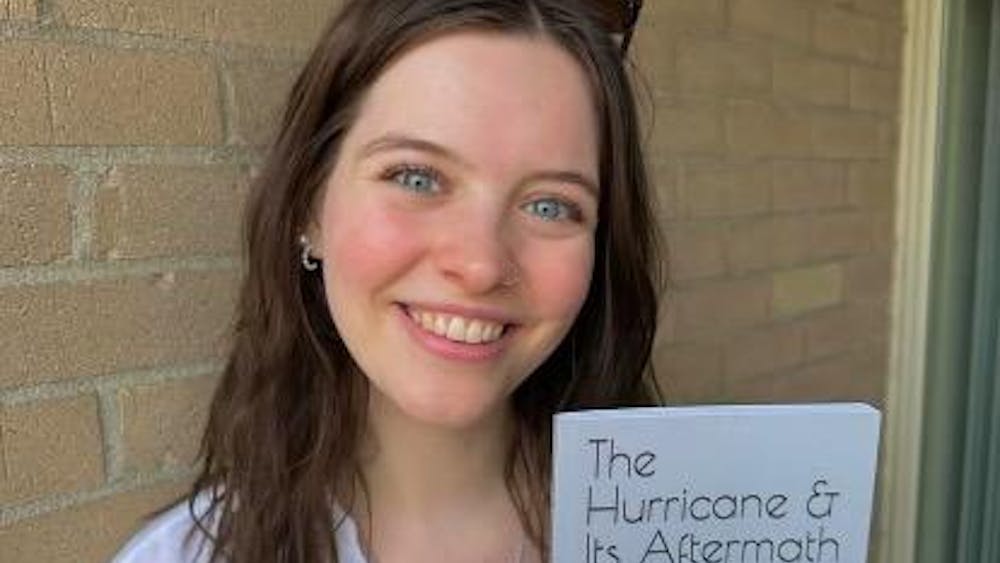Ukraine appears to be on the brink of war this week. With the ousting of Ukraine’s pro-Russian president Viktor Yanukovych, after months of violent protests, a new crisis has enveloped this former soviet republic.
The protest started last November when Yanukovych suddenly ended talks to join the European Union in favor of a sudden treaty tying the country closer to Russia.
Yanukoyych’s change of allegiance gave Ukrainians cause for protests, which have been bloodied by massive police crackdowns. Yanukovych retaliated further by passing a law banning protests, and even resorted to ordering the police use live ammunition on the protestors.
Despite this, 300,000 Ukrainians had joined the protests by December, according to Al Jazeera.
Meanwhile, Russian President Vladimir Putin cut costs in gas to Ukraine. Ukraine relies on Russia for its natural gas supply. The protests ended with a former prime minister, Yulia Tymoshenko, being released from jail and Yanukovych fleeing by helicopter.
The Crimean Peninsula, an autonomous republic with Ukraine, was stormed by a legion of unidentified armed and masked men on Feb. 28. They claimed to be a grassroots effort to provide security in the crisis. They took over the regional parliament and airports.
Meanwhile, Russian President Vladimir Putin engaged in surprise military drills with Russia’s vastly larger military within spitting distance of the Ukrainian border. As of March 2, the Russian military has openly been occupying the peninsula.
Similar to the 2008 war in Georgia, Putin has acted under the presumption that he is defending the rights of Russian speaking peoples and ethnic Russians within Ukraine.
“It’s clearly a violation of international law,” Judith Kullberg, a political science professor at EMU said.
Marla Bastien, a political science major who will be representing Russia at the Model UN Security Council meeting in New York this April, said the current situation in Ukraine was “predictable.”
“With the protests and uprisings, I knew that their government would fall and that Russia would try to intervene at any price,” Bastien said. “Russia had always been against Ukraine trying to be part of the EU. In fact, many Ukrainians, especially the ones in Crimea, see themselves as partly Russian and therefore welcome Russia into their country.”
The Crimean peninsula is an autonomous republic within Ukraine, but it is home to a sizeable Russian majority. According to a law currently being considered in Moscow, a new state could join the Russian Federation if it votes to. Vladimir Putin has already taken over the peninsula, and a senior Russian admiral in the Black Fleet ordered the Ukrainian navy to pledge their allegiance to the autonomous republic or to surrender. Later, the Russian Ministry of Foreign Affairs denied that there had been an ultimatum. That deadline passed on Tuesday.
“Russia has no claim to the Crimean Peninsula,” Kullberg said. “It has no standing in international law. Any claim that it has is based upon historic culture the presence of Russian speaking people living in the peninsula. But in terms of international law Russia has no claim to Crimea.”
“France and the USA are already talking about boycotting the G8 summit this year in Russia if they do not step out of Ukraine.” Bastien said, “The USA will always try to stop Russia from being the one in control of a conflict which creates more tensions between the two countries.”
Russia’s parliament retroactively approved Putin’s use of force in Crimeria to protect the naval base the Russians have there. Built by Catherine the Great, it serves as the main base for Russia’s Black Sea Fleet.
The Russians have a lease on the base under a treaty signed in the 1990s. The Russian military originally claimed to be securing their bases in the wake of the country’s unrest, but interim Prime Minister Arseniy Yatsenyuk has called this new expansion of occupation an act of war.
Putin has made it clear that he still considers Yanukovich to be the legitimate president of Ukraine, despite Yanukovich’s impeachment by Ukraine’s parliament and a warrant issued for his arrest.
Kullberg believes all of Yanukovich’s legitimacy has evaporated.
“I think he’s finished,” Kullberg said.
That has not stopped Yanukovych from asking for Russian troops, Vitaly Churkin, Russia’s ambassador to the UN, told the Security Council on Saturday. According to the BBC, Ambassador
Churkin said it was a human rights protection mission. U.S. Ambassador Samantha Power, rejected these claims.
“Russian mobilization is a response to an imaginary threat,” Power said.
Vice President Joe Biden warned of oncoming political and economic isolation during a phone call with Russia’s prime minister, Dmitry Medvedev.
“I think that the U.S. will continue to act as it has already,” Kullberg said, “the outlawing of the response with was an attempt to appeal to Russia through international institutions through the exertion of a large amount of pressure from international institutions including the G7, United
Nations, the EU – that was the first step where we are right now. And depending on Russia’s actions, that pressure could be intensified to include a range of sanctions against Russia.”
State Department spokeswoman Jen Psaki said that sanctions were possible. But CNN reported that Putin has showed no sign of backing down, despite threats of sanctions from the EU and the UN.
President Obama said during a meeting with Israeli Prime Minister Benjamin Netanyahu that he would attempt to lead an international effort against Russia.
According to Politico, Obama said he wanted a solution that was satisfactory to both the Ukrainian and Russian people, irrespective of the opinion of the U.S. Whether President Obama can do that or not is yet to be seen.
“We are examining a whole series of steps – economic, diplomatic – that will isolate Russia,” Obama said. “My interest is seeing the Ukrainian people being able to determine their own destiny.”
Kullberg will be holding a Ukrainian roundtable discussion Wednesday, March 13th. If you are interested, you can contact Kullberg at the political science department or professor Kelly Victor-Burke at the geography department.








